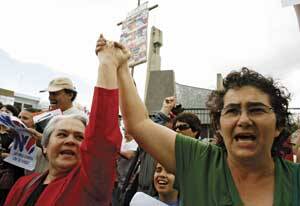Five years after Central America was dubbed a “top destination for gold mining,” anti-mining movements led by the church have pushed governments in the region to freeze mining permits and to consider laws that levy heftier taxes on miners. Throughout the region there is “open hostility to mining from parts of the population and from the establishment, including the Catholic Church, and governments,” said Thomas Power, an economist at the University of Montana. “There are public protests and ongoing political actions to constrain mining.”
In several cases bishops have criticized mining operations, arguing that they cause extensive environmental and social damage that outweighs the community investment and taxes paid by mining companies. “Mining is [environmentally] dangerous in Central America. The methods that are used to separate gold and silver from the rest of the matter utilize cyanide, which is highly pollutant,” Archbishop José Escobar Alas of San Salvador told the French news agency Agence France-Presse in mid-February.
In late February, Bishop álvaro Ramazzini Imeri of San Marcos, Guatemala, whose diocese is home to that nation’s largest gold mine, led an anti-mining rally and called for a two-year national moratorium on mining licenses, a move that has already curbed investment in mines. “It’s undoubtedly a major deterrent to future investment in the region. We stopped all of our work last July and made it abundantly clear that we’re not moving forward,” said Barbara Henderson, senior vice president of investor relations for Canadian-based Pacific Rim Mining, which has three mining sites in El Salvador. “I can’t imagine it’s not a deterrent for other mining companies as well.”
Gold speculators have long been aware of Central American gold deposits. Because the gold is thinly distributed throughout the soil, sodium cyanide is needed to separate the gold and silver ore from other, less valuable metals, a process that is not environmentally friendly and is very costly. So mining companies largely avoided exploring Central America until the price of gold began to spike. In 2000, the metal traded for about $300 an ounce. This year, it has traded above $950 an ounce and may top $1,000. In response to the rising value of gold, mining companies began to explore the area and governments handed out hundreds of permits. In 2005 the Marlin Mine, one of the largest foreign investments in Guatemala, opened in San Marcos.
Bishop Ramazzini soon began talking openly about the mine’s negative effects, and controversy followed. Local residents, who said they were not informed about the mine before it opened, engaged in protests that at times turned violent. At least two anti-mining activists were killed, and Bishop Ramazzini has received death threats.
Bishops in neighboring countries followed Ramazzini’s anti-mining position. The church’s stance, coupled with protests and an international publicity campaign, gave the issue traction. Now governments that were once openly welcoming mines are reconsidering. The number of licenses for exploration in Guatemala fell from 740 in 2004 to fewer than 250 in 2007, according to the Ministry of Energy and Mines. In Honduras, one mine has shut down, leaving the country with four sites. El Salvador has not seen any new operations open since 2004.








